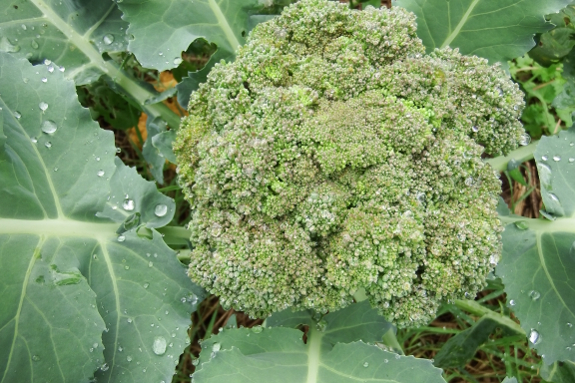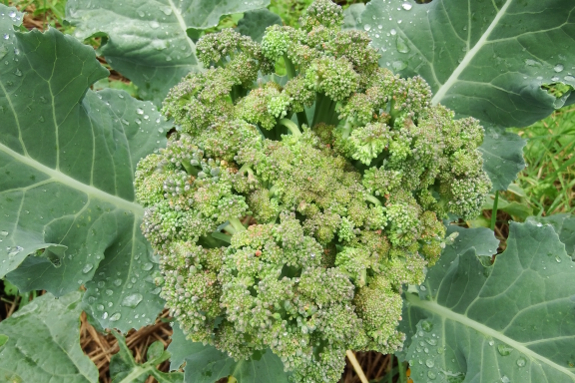
Becoming a broccoli-growing pro

Several of you asked very
astute questions on
my broccoli post last week. Let's see if I can some up the answers all
in one post.
In terms of variety selection, I haven't really
hit a dud yet...but I also choose those that promise one big head
(since you can always get multiple smaller heads later after cutting
the main event). I've grown Packman, Marathon, and Blue Wind, and as I
recall they all did great for me. Blue Wind is the variety we're
growing this year.
Planting dates will vary widely
depending on where you live and what type of spring you're
experiencing. I've had best luck starting mine inside at the beginning
of March, then transplanting into the garden as soon as there will be
no lows below 28. This year, that date came early --- March 27.

And then there are the
questions none of you asked, but which I think are equally important to
producing good broccoli. First --- food.
Broccoli is a very hungry crop, so the more you can feed them the
better. They also need full sun
to put on those fast growth spurts before the bugs hit.
Which brings me to the
biggest problem organic growers will have with broccoli --- caterpillars. The big green cabbage worms
actually don't bug us much as long as we plant early and I squash the
few I notice, but the less obvious southern cabbage worms can be a
doozy. See that head in the second photo above with spaces between its
florets? Southern cabbage worms have been eating it from the inside
out, and they're a bear to clear out of the head in the kitchen too.
The solution to cabbage
worms (assuming you don't want to spray insecticides) is planting early
and keeping your garden crucifer-free in the summer months. If you can
harvest your broccoli before the beginning of June, you probably won't
have to deal with many southern cabbage worms. And if you pull the
spring plants soon thereafter rather than letting them push out an
extra floret or two throughout the summer months, cabbage worms won't
be able to get a foothold on your garden and be ready to hit the ground
running next year.
If all else fails, don't
despair --- there's always the fall crop! Start seeds inside around the
middle of June and you'll be eating another round of broccoli before
you know it. Good luck!
Want more in-depth information? Browse through our books.
Or explore more posts by date or by subject.
About us: Anna Hess and Mark Hamilton spent over a decade living self-sufficiently in the mountains of Virginia before moving north to start over from scratch in the foothills of Ohio. They've experimented with permaculture, no-till gardening, trailersteading, home-based microbusinesses and much more, writing about their adventures in both blogs and books.
Want to be notified when new comments are posted on this page? Click on the RSS button after you add a comment to subscribe to the comment feed, or simply check the box beside "email replies to me" while writing your comment.

Since broccoli is a cold-weather plant and can stand some frost, I start mine in January and put them out in late February or March under insect netting. That's the only way I can keep those damned (expletive deleted) cabbage moths off the brassicas. Finally got a decent crop this year and the cooler weather we've been having has helped me harvest two crops already. They're producing third side-shoots already. Yay broccoli!
Cauliflower - not so good however.
Thank you for the answers! To the other commenter, yes, cauliflower is tricky. I've read that if the temperatures drop below 50, they have a tendency to bolt.